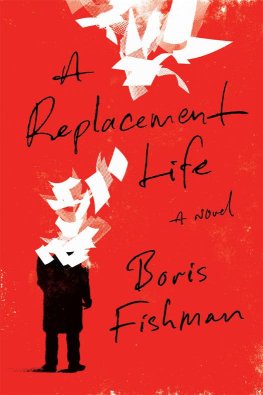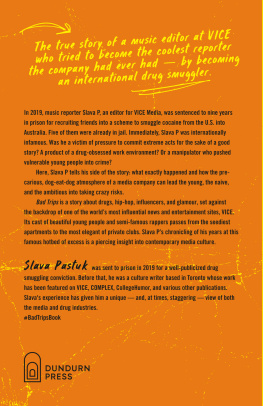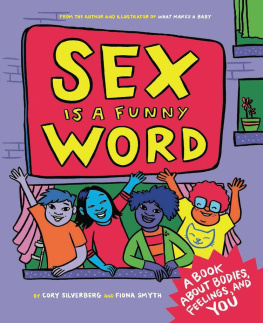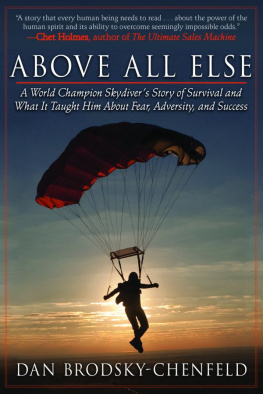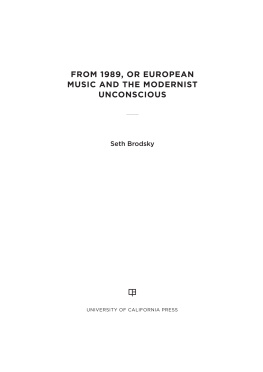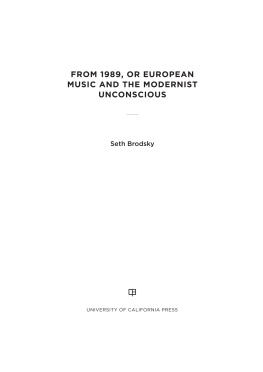Slava Brodsky - Funny Children's Stories
Here you can read online Slava Brodsky - Funny Children's Stories full text of the book (entire story) in english for free. Download pdf and epub, get meaning, cover and reviews about this ebook. year: 2012, publisher: Manhattan Academia, genre: History. Description of the work, (preface) as well as reviews are available. Best literature library LitArk.com created for fans of good reading and offers a wide selection of genres:
Romance novel
Science fiction
Adventure
Detective
Science
History
Home and family
Prose
Art
Politics
Computer
Non-fiction
Religion
Business
Children
Humor
Choose a favorite category and find really read worthwhile books. Enjoy immersion in the world of imagination, feel the emotions of the characters or learn something new for yourself, make an fascinating discovery.

- Book:Funny Children's Stories
- Author:
- Publisher:Manhattan Academia
- Genre:
- Year:2012
- ISBN:9781936581016
- Rating:3 / 5
- Favourites:Add to favourites
- Your mark:
- 60
- 1
- 2
- 3
- 4
- 5
Funny Children's Stories: summary, description and annotation
We offer to read an annotation, description, summary or preface (depends on what the author of the book "Funny Children's Stories" wrote himself). If you haven't found the necessary information about the book — write in the comments, we will try to find it.
Funny Children's Stories — read online for free the complete book (whole text) full work
Below is the text of the book, divided by pages. System saving the place of the last page read, allows you to conveniently read the book "Funny Children's Stories" online for free, without having to search again every time where you left off. Put a bookmark, and you can go to the page where you finished reading at any time.
Font size:
Interval:
Bookmark:
SlavaBrodsky
Funny
Children's Stories
Notes
of atwelve-year-old boy
Translated fromRussian
by HelenLeyzerovich
Manhattan Academia
Slava Brodsky
Funny Children's Stories
Translated fromRussian by Helen Leyzerovich
with editing help by Maria Tyutyunik and BahaRudin
Manhattan Academia,2012 112 p.
www.manhattanacademia.com
mail@manhattanacademia.com
ISBN: 978-1-936581-01-6
Copyright 2012 by Slava Brodsky
www.slavabrodsky.com
This editionis an English translation of a recently publishedRussian book, together with publishers comments for the American public.The book is a collection of short children's stories about the events that tookplace in Moscow (Russia) in the mid-fifties of the last century, a decade afterthe end of World War II. These stories may be of interest to both children andadults. Children will find many truly funny episodes in the book and will beable to look at the capital of Russia in the middle of the twentieth centurythrough the eyes of a twelve-year-old boy. Adults will be able to look at thesame events through their own eyes. They also will laugh or perhaps be a bitsad.
In memory of myparents
PublishersPreface
The HockeyStick
TheHandkerchief
Pygmies
The Tea Spoon
A SilverHalf-Ruble
An Ink Pencil
The Hole
Anton
The IrregularVerb
The Scooter
AmericanStewed Meat
EndlessFreeze!
The Wardrobe
Proof
The Old Shoes
My FriendGleb Paramonov
Kogan
To America for Gold
tude ofKreisler
Rhododendron
The Black Day
The Trick
Lisa
A SymphonyOrchestra
The Old Womanand the Cart
Hot Countries
Publishers Preface
At the beginning of last summer, an old friend of mine from Moscow stayed at my house. He told me all sorts of stories, both happy and sad. Amongother things, he informed me that his distant relative had passed on to himthree thick school notebooks filled with the notes of an unknown boy andimplored him to read them.
Right before leaving Moscow, my friend read these notes,became excited by their contents, and decided to bring them over to me. He alsoadded that his relative told him that after the death of their owner, thesenotebooks were passed from one person to another several times with a lastrequest from the author: to publish the notes either under a fictitious name orunder the name of the publisher. My friend told me that the notes, in essence,were short funny stories and, in his opinion, must be published without anydoubt. However, he had neither the time nor the means to do that, and so allhis hopes rested with me.
As soon as I began to read the boys stories, Iimmediately started to wonder whether I should, indeed, accept allresponsibility and expenses for their publication. And just in a fewdays, I was already working on editing them.
I must say that I tried to make as few corrections aspossible in the stories since they were written simply, briefly, and clearly. Ionly made minor editing changes and deciphered illegibly written words.
The boy himself, apparently, did not consider his notes asstories. So none of them had titles. After a short period of hesitation, I tookthe liberty of adding titles on behalf of the author. And I hope that by doingso I did not ruin the story line but only bestowed some necessary order on thetext.
Before I sent the manuscript to a printing company, I askedmy friend to find out whether some light could be shed on any details of theboys life. A short time later, my friend replied that no furtherinformation about the author of the stories could be obtained since none ofthose who had kept his notebooks was still alive.
And so, it remains for me to add just a few words. From thetext of the notes, it follows that the boy lived in Moscow. However, it isdifficult to say for sure where exactly in Moscow the described events tookplace. Based on what I have read and fragmentary information about the distantrelative of my friend, I can only assume, with a certain degree of confidence,that everything happened not far from Moscows square of three trainstations. Most likely, where Bolshaya Pereyaslavskaya Street intersects with Bezbozhny Lane (now Protopopovsky Lane) and Kalanchevka Street, or where Bolshoi Balkansky Lane goes up from Kalanchevka.
It is safe to say that the stories were written in themid-fifties of the past century, more than ten years after the end of World WarII. At that time, the area of the three train stations and surrounding streetswere considered a restless region of Moscow. Yet, apparently, the boy came froma rather prosperous family. In the stories, he indicated his own age twelve, and I think there is no reason to doubt that.
SlavaBrodsky
Millburn, New Jersey
March17, 2007
Funny
Children's Stories
Notes
ofa twelve-year-old boy
The Hockey Stick
Today we played hockey. In the winter we play hockey veryoften. Because in the winter it is the most interesting thing we can do. Andour winters last for a long time. They last for nearly half a year, fromNovember to March. But sometimes it can snow even in April and October.
Honestly, it is not quite hockey. We do not play on ice. Weplay on pressed snow. So we play without skates. We just run in shoes or, moreoften, in felt boots. And if we run in felt boots then we, of course, weargaloshes over them.
Sometimes they make a skating rink for us. But first of all,this happens very rarely, and second, we play in felt boots anyway. We play infelt boots because the ice is uneven. So it is difficult to skate on it.Besides, not everyone has skates.
Today there was no ice in the rink. But we trampled the snowso hard that the puck went over it just fine. It moved very well. It almostslid. And it slid over the snow because our puck is very good.
We make it out of an empty tin can. But not out of a tall can,of course. We make a puck out of a flat tin. And the best tin is one that isopened only a quarter or a third of the way, no more.
If we put something heavy inside and bend the lid back, itbecomes a pretty decent puck. And there is no fuss with it. We hide itsomewhere right in our yard. And we have never lost it. Probably because no oneelse has any need for it.
There is another difference between our game and realhockey. We play without hockey sticks. But not because we do not have them.Some of us do have hockey sticks. Using tin metal, we attach an oblong piece ofplywood to a wooden stick, thus making a Canadian hockey stick. But noteveryone has such a stick. And when someone plays with a hockey stick andsomeone else, without a hockey stick, it ends very badly for the stick. Whenthe stick collides with a felt boot, it immediately breaks. For this reason, weare afraid to play with hockey sticks. However, if someone has a hockey stick,he still brings it out to the yard. But he brings it just for the warm up. Andwhen we start to keep score, everybody knows that it is better to put thehockey stick aside.
Next pageFont size:
Interval:
Bookmark:
Similar books «Funny Children's Stories»
Look at similar books to Funny Children's Stories. We have selected literature similar in name and meaning in the hope of providing readers with more options to find new, interesting, not yet read works.
Discussion, reviews of the book Funny Children's Stories and just readers' own opinions. Leave your comments, write what you think about the work, its meaning or the main characters. Specify what exactly you liked and what you didn't like, and why you think so.

